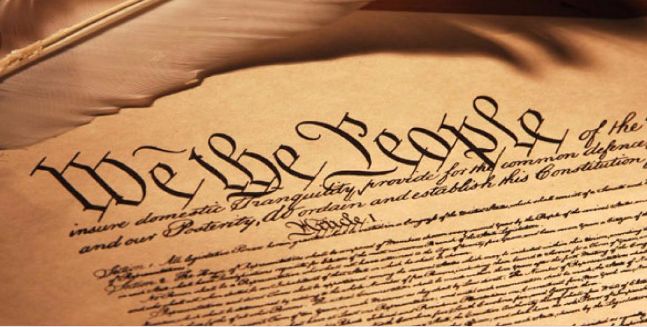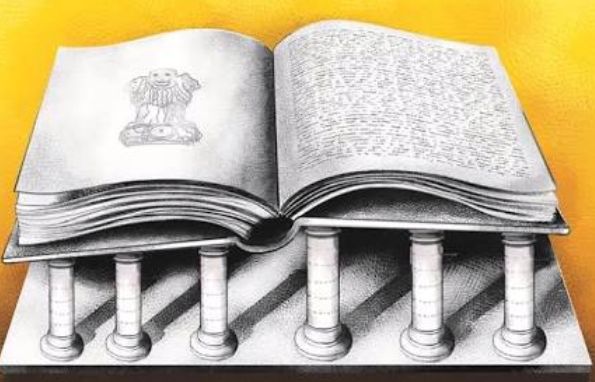Right To Equality
Jun 23, 2019 • 43 views
Constitution is a document according to which a country is governed. It lays down rules and regulations that help in the smooth functioning of different institutions and implementation of the rights of citizens.

Constitution of India is the apex law of India. It is the longest written constitution and the constituent assembly was elected to draft it. It took two years eleven months and seveteen days to complete this historic task under the chairmanship of Dr. B. R Ambedkar. It was adopted on 26th November 1949 and members appended their signature on 24th January 1950 ( in all, 284 members actually signed it). While Dr. Sachidanand Sinha was the first and temporary president of the constituent assembly, Dr. Rajendra Prasad later became the permanent president and ,vice president was Prof. Harendra Kumar Mookherjee. Indian constitution is also called:
A. Carbon copy of GOI Act 1935.
B. Paradise of lawyers.
C. Borrowed constitution.
It consists of a preamble, 22 parts, 12 schedules and 395 articles.

Part third of the constitution extends from Article 12-35 and it delineates about fundamental rights. These fundamental rights are known to be the "basic and civil liberties" provided to the people of India. There are following fundamental rights:
1. Right to equality (article 14-18)
2. Right to freedom (article 19-22).
3. Right against exploitation (article 23-24).
4. Right to freedom of religion (article 25-28).
5. Cultural and educational rights (29-30).
6. Right to constitutional remedies (article 32-35).
Article 12 & 13 defines 'state' and 'law' respectively. It is worth pondering that why is there need to insert them in the part containing fundamental rights. So, the reason behind this is to educate citizens about the institution against whom these rights are enforceable (I.e state) and which laws are covered under these rights.
In case of violation of fundamental rights, one can directly approach the Supreme Court as per Article-32 by means of writs such as Habeas Corpus, Mandamus, Prohibition, Certiorari, and Quo Warranto.
Right to equality is one of the most important fundamental rights which lays foundation for other rights and liberties, and is provided in Articles-14, 15, 16, 17 & 18.
Article 14-
There are two basic components of this article and they are equality before law (a negative concept taken from UK) and equal protection of law (positive concept taken from US). Former states that everyone shall be treated equally irrespective of rank and position. While the latter confers that everyone shall enjoy equal protection and remove the existing inequality by bringing in necessary steps.

An important concept that must be taken into consideration while talking about this article is 'Rule of Law'. It guarantees equality before law and is an aspect of worth. Dicey called Rule of Law in England as "it means that no man is above law and that every person whatever be his rank, he is subject to jurisdiction of the ordinary course".
Prof Dicey gave following meanings of Rule of Law:
1. Absence of arbitrary power, or supremacy of law.
2. Equality before law.
3. Absence of individual liberty.
Exceptions to this rule applies to governor, president, foreign ambassador (diplomatic immunity).
Another vital concept is of class classification and class legislation. Class classification is a positive classification and is reasonable and logical. For ex: Tax imposed on imported cars, while no tax on indigenous cars. This is coherent to protect the interests of local manufacturers. While class legislation is a negative classification and is unreasonable and illogical. For ex: More grants to private engineering college than private law college.
Article 15-
It says that the state shall not discriminate against any citizen on grounds only of religion, race, sex, place of birth, or any of them.
Article 16-
It says that there shall be equality of opportunity for all citizens in matters of public employment or appointment to any office under the state.
Article 17-
It says that untouchability is abolished and its practice in any form is forbidden. In the exercise of this power, parliament has enacted the untouchability Act 1955. This act has been amended and renamed in 1976 as the protection of civil rights act 1955. It is applicable against private body as well.
Article 18-
It says that no title, not being military and academic distinction, shall be conferred by the state. No citizen of India shall accept any title from any foreign state. The awards, Bharat Ratna, Padma Vibhusan, Padma Bhusan, Padma Shri called as the National Awards would not amount to title within the meaning of article 18(1).
Constitution is above all the laws in India and fundamental rights are one of the most crucial part of it. Right to equality confers serious equality among citizens. It is a major drive towards uniformity and collective contribution in governance. Democracy requires an informed citizenry because only an enlightened citizen can efficiently make the best out of it.
